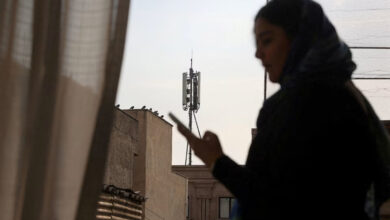After successfully dislodging decades-old autocracies, pro-democracy activists in Egypt and Tunisia are striving to protect their hard-won gains through fragile transitions dotted with setbacks.
It took just weeks to unseat Tunisian strongman Zine al-Abidine Ben Ali in January and Egyptian veteran Hosni Mubarak in February but that momentum seems to have hit a stone wall, activists say.
The cyberworld that helped mobilize and document the uprisings, is now flickering with the frustration that progress is too slow, as activists struggle to see their Arab Spring blossom into full-fledged democracies.
In Tunisia, a cyber dissident turned minister has resigned from his cabinet post and in Egypt online activists launched a day of criticism against the ruling military council, all in apparent frustration at the pace of democratic change.
Slim Amamou who went from influential underground blogger under Ben Ali to secretary of state for sport and youth in the post-revolution government, resigned this week saying he was "not made for politics."
The champion of Internet freedom told listeners on Tunisian radio station Express FM that he was frustrated with the return of online censorship, after authorities shut down four websites at the army's request.
"There are many reasons for my resignation but generally I can say I will feel more useful outside the government," he said.
"I'm also irritated by the behavior of the police," he said, in reference to police attacks earlier this month against journalists covering anti-government demonstrations that left reporters wondering if the bad old days had returned.
In Egypt, cyberactivists vented their own frustration at the slow pace of reform and the tight controls imposed by the ruling Supreme Council of the Armed Forces (SCAF) which took power when Mubarak was ousted.
On 23 May, nearly 400 blogs took part in a day dubbed No SCAF day, publishing posts against the military junta, which has come under fire from human rights groups for punishing critics.
Last month a blogger was sentenced to three years by a military court for criticizing the institution.
The army, at first idolized as hero of the revolution for not firing on protesters, has come under criticism for the slow pace of reform and for alleged rights abuses.
It "should know that the sacrifices made to face Mubarak's tyranny can be easily repeated to face any other form of tyranny," blogger Amr Moneib said on No SCAF day, calling on the military to "go back to its barracks."
"It was a revolution and not a coup," he snapped.
He criticized the "very slow trial of members of the deposed regime," saying the pace of reform made the process look like a "charade."
Others say that while there have been major gains, not just the removal of the Mubarak regime from power but greater public confidence about expressing dissent, there is still much work to be done.
"The main obstacle is that there seems to be no political will to change from those in charge," said Ahmed Imam, a spokesman for the National Front for Justice and Democracy, a grouping of pro-democracy activists.
Egypt's military council "is part of the old regime and (its members) are worried about real democracy because it would expose them and they would have to be held accountable," he told AFP.
Activists in both countries agree that the pressure must be kept up to ensure the transition processes under way give birth to freedom, justice and representative governments.
"We must continue to pressure the military council for a transition to full democracy. The street must keep moving," said Imam, who had joined hundreds of thousands in Cairo's Tahrir Square to call for democratic change.
In Tunisia, some say the post-revolution landscape is proving difficult to navigate.
"Before things were simple: you had the good guys on one side, and the bad guys on the other. Today, things are more subtle," said Riadh Guerfali who runs the independent collective blog Nawaat.org and goes by the alias Astrubal.
The website was banned under Ben Ali's strict censorship rules, but despite its new open status, the fight for freedom is far from over, said Guerfali.
"A few weeks ago (Tunisians) prided ourselves on a 100% free Internet. But for a few weeks now, some Facebook pages have been censored at the order of a military court," he said.
"We will continue to defend freedom of expression, it is a fight every day," he added.




